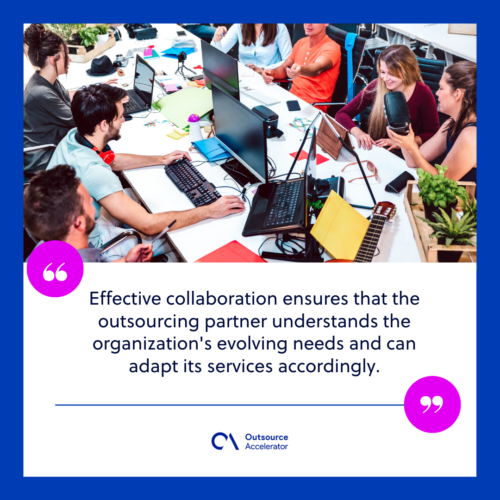Transforming IT infrastructure: The role of outsourcing in digital transformation

This article is a submission by Nezdex. Nezdex offers a comprehensive suite of outsourcing solutions to help startups and small businesses thrive.
Digital transformation has emerged as the cornerstone of success today. Technologies have integrated into all aspects of a business, further changing how it operates and delivers value.
The primary goals of digital transformation are to enhance customer experience, improve operational efficiency, and drive innovation.
At the heart of successful digital transformation lies a robust and agile IT infrastructure, the backbone of an organization’s technology ecosystem.
This infrastructure supports critical functions, including data storage, communication, cybersecurity, and cloud computing.
However, the challenge of building and maintaining such a complex and resource-intensive IT infrastructure has led companies to explore the potential benefits of outsourcing.
Factors affecting the rise of outsourcing in IT infrastructure
Outsourcing IT infrastructure refers to partnering with third-party service providers to handle various aspects of an organization’s technology requirements. This could include tasks such as server management, network maintenance, software development, help desk support, and security services.
The rise of IT infrastructure outsourcing can be attributed to several key factors:
1. Expertise and specialization
Outsourcing allows businesses to tap into a pool of specialized IT experts and providers with cutting-edge knowledge and experience in their respective domains.
These providers are dedicated to staying up-to-date with the latest technological advancements, enabling organizations to benefit from best practices and industry standards. This access to specialized expertise can be a game-changer in an era where technology evolves rapidly.

2. Cost-efficiency
Building and maintaining an in-house IT department with all the necessary resources can be prohibitively expensive for many organizations.
Outsourcing allows companies to convert fixed IT costs into variable costs. Clients pay only for the services they need when they need them.
This cost flexibility can lead to substantial savings and improved financial management, enabling organizations to allocate resources strategically.
3. Scalability and flexibility
Digital transformation often requires organizations to scale their IT infrastructure dynamically to accommodate fluctuating demands.
Outsourcing provides the agility to scale up or down swiftly in response to evolving business needs. Meanwhile, service providers guarantee the IT infrastructure remains aligned with the company’s objectives.
This flexibility is essential for organizations striving to adapt to rapidly changing market conditions.
4. Focus on core competencies
Outsourcing non-core IT functions allows businesses to concentrate on their core competencies and strategic initiatives. This allows them to channel their resources and energy into activities directly impacting their competitive advantage and value proposition.
For example, a manufacturing company can focus on improving its production processes while leaving the management of its IT infrastructure to external experts.
5. Enhanced security and compliance
Outsourcing providers often have stringent security protocols and compliance measures to protect sensitive data and intellectual property.
This expertise in cybersecurity helps bolster an organization’s defense against the growing threats of cyberattacks, which are increasingly prevalent in today’s interconnected digital landscape.
Key considerations for IT infrastructure outsourcing
While outsourcing IT infrastructure can yield numerous benefits, organizations must approach the process strategically. Keep in mind some key considerations when outsourcing IT infrastructure services.
1. Vendor selection
Firstly, choosing the right outsourcing partner is crucial for the success of digital transformation. Organizations must thoroughly evaluate potential vendors, considering expertise, track record, service offerings, security protocols, and client testimonials.
The outsourcing decision should align with the organization’s long-term goals and technology roadmap.
2. Service-level agreements (SLAs)
Clear and well-defined Service-Level Agreements (SLAs) are essential to establish expectations and ensure the outsourcing provider meets agreed-upon service levels.
SLAs should cover response times, issue resolution, uptime guarantees, and data security. These agreements are the foundation for a successful outsourcing partnership, setting expectations and holding both parties accountable.
3. Data security and compliance
Data security is of utmost importance in the digital age. Organizations must ensure the outsourcing partner adheres to robust security measures and complies with relevant regulations and industry standards.
This is particularly critical when outsourcing sensitive operations where compliance with regulations like HIPAA or GDPR is mandatory.
4. IT integration
The outsourced IT infrastructure should seamlessly integrate with the organization’s existing systems and technologies. Compatibility and interoperability are critical to avoid disruptions and maintain a smooth digital transformation journey.
This requires thorough planning and coordination to ensure the outsourced solutions align with the organization’s existing technology stack.
5. Continuous collaboration
Lastly, maintaining open lines of communication and fostering a collaborative relationship with the outsourcing provider is essential. Regular meetings, progress reports, and feedback sessions can help address any issues promptly and keep the transformation on track.
Effective collaboration ensures that the outsourcing partner understands the organization’s evolving needs and can adapt its services accordingly.

Outsourcing IT infrastructure services
As digital transformation becomes necessary for businesses to thrive, outsourcing IT infrastructure is emerging as a viable and strategic solution. Leveraging the expertise, cost efficiency, scalability, and flexibility provided by outsourcing partners enables organizations to focus on their core competencies and drive innovation.
In the modern era, businesses that fail to adapt risk being left behind. The strategic imperatives of digital transformation and IT infrastructure outsourcing go hand in hand, providing organizations with the tools and capabilities they need to thrive in a digital-first world.
When done strategically, outsourcing IT infrastructure can be a game-changing move that allows organizations to focus on their core competencies, adapt to changing market conditions, and enhance their security posture.
It provides the flexibility to scale up or down as needed while converting fixed IT costs into variable costs, resulting in substantial cost savings.
For businesses seeking to embark on the digital transformation journey and considering IT infrastructure outsourcing, remember that success lies in careful planning, vendor selection, clear SLAs, and ongoing communication and collaboration.
The digital era is here to stay, and the organizations that embrace it with the right IT infrastructure strategy will thrive and succeed.







 Independent
Independent




